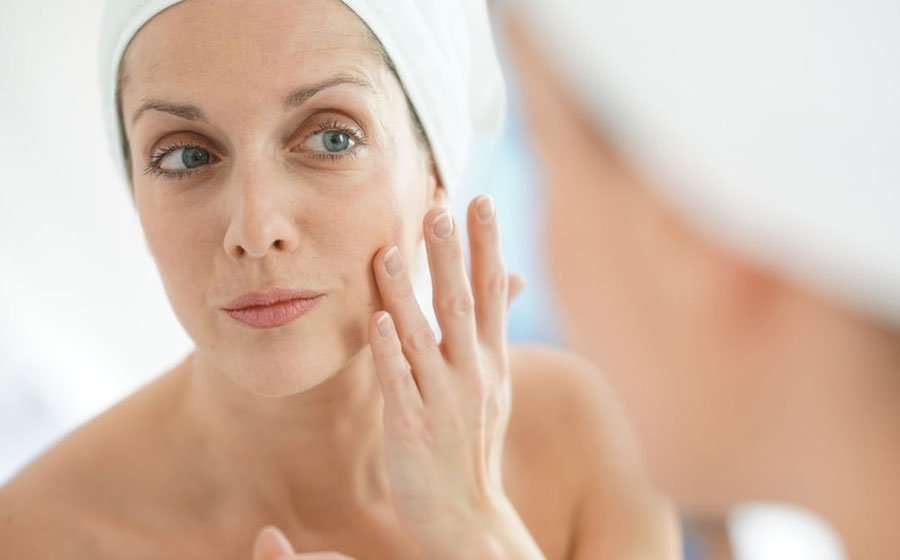Women are known to be more sensitive than men, which is especially true regarding the skin. The skin is the largest organ in the body and is also one of the most sensitive. When a woman goes through menopause, her hormone levels change, and if she doesn’t understand how these changes will affect her skin, she could end up with some unwanted side effects.
In this blog post, we’ll talk about what happens when you go through menopause and how your skin can change. We’ll also discuss some common symptoms that women experience during this time, along with tips for keeping your skin looking great!
Hormonal Changes
Hormonal changes are a normal part of women’s body’s development and function. They can be caused by many factors, including puberty, pregnancy, and menopause. Hormonal changes can cause mood swings, weight gain or loss, acne breakouts, hair loss, and more.
Hormonal changes are a big part of what affects your skin during different periods, especially post-menopause. When estrogen levels drop, the skin loses its ability to regenerate itself. Without this renewal process, your skin can become dull and dry, as well as more prone to irritation and sensitivity.
Estrogen is a female sex hormone that, as you probably know, regulates your reproductive organs and menstrual cycle. Without it, you can have many problems, including dryness, redness and irritation, and even acne. Your skin will be the first thing to show it.
Common Skin Changes during Post-Menopause
These are the most common skin changes during post-menopause:
Dry Skin
Dry skin occurs when your body’s oil glands stop producing enough oil to keep you hydrated.
Thinning of the Skin
This happens because your body produces less estrogen, a hormone that helps keep your skin healthy and elastic.
Wrinkles and Fine Lines
They are caused by a decrease in estrogen, usually the cause of skin aging. Wrinkles and fine lines can appear on the face, arms, hands, neck, and chest. One way to counteract these changes is to consume collagen for fine lines wrinkles.
Age Spots and Hyperpigmentation
These conditions can make you self-conscious about your appearance, especially if you’re used to having a flawless complexion.
Acne and Other Skin Conditions
During the post-menopausal phase, many women experience changes to their skin. These include acne, rashes, and dryness. While these conditions are commonly associated with menopause, they can also be caused by other factors such as stress, medications, or an underlying medical condition.
Although you may feel like your skin is the only thing changing as you age, it’s important to remember that everything else in your body is changing too. Menopause often comes with other symptoms like hot flashes and night sweats; however, these can be managed with certain medications to continue living life as you always have!
Skin Care during Post-Menopause
It’s safe to say that most women are concerned with their skincare routine during post-menopause.
Women who have gone through menopause know that the skin on our face changes—we can start to see wrinkles and fine lines appear, and our skin can become drier than ever before. That’s why finding a good skin care routine that works for you is important.
Here are some tips for caring for post-menopausal skin:
- Drink lots of water. Hydration is key when you’re going through menopause, so drink plenty of water throughout the day. A good rule of thumb is to drink half your body weight in ounces daily (so if you weigh 100 pounds, drink 50 ounces).
- Stay out of the sun as much as possible (especially during peak hours from 10 AM – 3 PM). If you must be outside during this time, wear sunscreen with an SPF 30 or higher and cover up with long sleeves and pants if possible.
- Try moisturizing twice a day instead of once. The lack of estrogen in your body can cause dryness in your skin, especially around your eyes and mouth, so try rubbing on some lotion before heading out for errands or work in the morning, then again at night before bedtime.
We’ve got some recommendations for products that are specifically designed to address the needs of your skin as you transition into menopause and beyond, including:
- A gentle exfoliant
- A night cream with retinol for anti-aging benefits
- A serum with peptides for anti-aging benefits
There are a variety of menopause supplements in the UK that can help address issues such as dryness, thinning, and loss of elasticity in the skin. By incorporating a menopause supplement into your skincare routine, you can provide your skin with the targeted support it needs to stay healthy and vibrant as you age.
Additionally, lifestyle changes can help improve your skin’s health during post-menopause. Some lifestyle changes include:
- Drinking water and eating enough fruits and vegetables
- Exercising regularly
- Getting enough sleep each night.
Medical Treatments for Post-Menopausal Skin Issues
It’s important to know that there are medical treatments for post-menopausal skin issues, including wrinkles and acne. And the great news is that these treatments are effective and relatively safe.
Hormone Replacement Therapy
Hormone replacement therapy (HRT) can be a great option for women experiencing post-menopausal skin issues. It’s often used to treat the symptoms of menopause, including hot flashes, vaginal dryness, anxiety, and mood swings. But it can also help with skin problems like wrinkles and dryness due to lower estrogen levels.
Hormone replacement therapy, or HRT, is a form of treatment that uses estrogen to relieve the symptoms associated with menopause. It can be prescribed by your doctor to treat many post-menopausal skin issues, including thinning and dry skin, muscle and joint pain, fatigue and loss of energy, vaginal dryness (atrophic vaginitis), mood swings, headaches, and sleep problems.
Other medical treatments for post-menopausal skin issues include topical estrogen creams and gels. These can be used to reduce the appearance of wrinkles, but they also help to prevent vaginal dryness and other symptoms that come with menopause.
Medical treatments for post-menopausal skin issues are not something you should take lightly. There are many risks involved, and the benefits are limited. That’s why it’s important to weigh your options and ensure that your treatment is right.
Takeaway
Menopause can significantly impact a woman’s skin, causing dryness, thinning, wrinkles, age spots, and other issues. The decrease in estrogen is a significant factor in these changes, leading to a loss of elasticity and a slower renewal process.
Women must stay hydrated, avoid the sun during peak hours, and adopt a comprehensive skincare routine that includes moisturizing, exfoliation and using products with peptides and retinol. It’s important to consider a daily supplement specifically designed to address the unique needs of this life stage.
In addition, women can consider lifestyle changes like eating a healthy diet, exercising regularly, and getting enough sleep. Medical treatments like hormone replacement therapy can also be considered if symptoms are severe. With the right care and attention, women can manage their post-menopausal skin issues and feel confident and beautiful at any age.
















